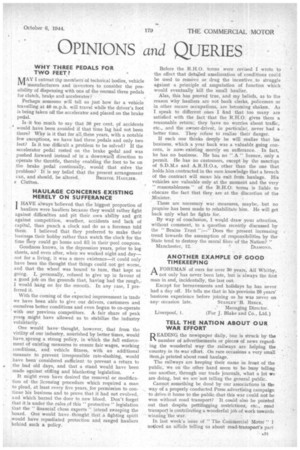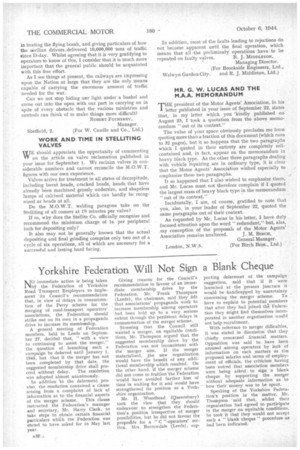OPINIONS and QUERIES WHY THREE PEDALS FOR TWO FEET . ?
Page 33

Page 34

If you've noticed an error in this article please click here to report it so we can fix it.
MAY I entreat thr members of technical bodies, vehicle 11'1 manufacturers and inventors to consider the possibility of dispensing with one of the normal three pedals for clutch, brake and accelerator?
Perhaps someone will tell us just how far a vehicle travelling at 40 m.p.h. will travel while the driver's foot is being taken off the accelerator and placed on the brake pedal.
Is it too much to say that 30 per cent. of accidents would have been avoided if that time lag had not been there? Why is it that for all,these years, with a notable few exceptions, we have had three pedals and only two feet? Is it too difficult a problem to be solved? If the accelerator pedal rested on the brake psdal and was pushed forward instead of in a downwarZ direction to operate the throttle, thereby enabling the foot to be on the brake pedal continually, would that solve the problem? It is my belief that the present arrangement
can, and should, be altered. BRISTOL HAULIER. e Glutton.
HAULAGE CONCERNS EXISTING MERELY ON SUFFERANCE
I HAVE always believed that the biggest proportion of
hauliers were hauliers because they would rather fight against difficulties and pit their own ability and grit against competition, weather, accidents and lack of capital, than punch a clock and do as a foreman told them. I believed that they preferred to make their business their hobby rather than watch the clock for the time ithey could go home and fill in their pool coupons.
Goodness knows, in the depression years, prior to log sheets, and even after, when we worked night and day— not for a living, it was a mere existence—it could only have been the thought that things could not get worse, and that the wheel was bound to turn, that kept us going. I, personally, refused to give up in favour of a good job on the grounds that, having had the rough,. I would hang on for the smooth. In any case, I preferred it.
With the coming of the expected improvement in trade we have been able to give our drivers, customers and ourselves better conditions and even begun to co-operate with our previous competitors. A fair share of peak years might have allowed us to stabilize the industry voluntarily.
One would have 'thought, however, that from the virility of our industry, nourished by better times, would have sprung a strong policy, in which the full enforcement of existing measures to ensure fair wages, working conditions, and vehicle fitness, with an additional measure to prevent irresponsible rate-slashing, would have been considered sufficient to prevent a return to the bad old days, and that a stand would have been made against stifling and blanketing legislation.
It might even have desired the removal or modification of the licensing procedure which required a man to plead, at least every five years, for permission to continue his business and to prove that it had not evolved, and which barred the door to new blood. Don't forget that it is under the rules of this " protective " legislation that the "financial chess experts" intend sweeping the board. One would have thought that a fighting spirit would have repudiated protection and ranged hauliers behind such a policy. Before the R.H.O. terms were revised I wrote to the effect that detailed amelioration of conditions could be used to remove or drug the incentive, to struggle against a principle of amputation of function which would eventually kill the small haulier.
Alas, this has proved true, and my beliefs, as to the reason why hauliers are not bank clerks, policemen or in other secure occupations, are betoming shaken. As I speak to different ones I find that too many are satisfied with the fact that the R.H.O. gives them a reasonable return; they have no worries about traffic, etc., and the owner-driver, in particular, never had a better time. They refuse to realize their danger.
If each one thinks deeply he will realize that hie business, which a year back was a valuable going concern, is now, existing merely on sufferance. In fact, he has no business. Re has no " A " licence, only a permit. He has no customers, except by the sanctiqn of S.D.M.s and A.R.H.O.s, other than the one that holds him contracted in the sure knowledge that a breach of the contract will mean his exit from haulage. His vehicles are valuable only at the moment and the very " reasonableness " of the R.H.O. terms is liable to obscure the fact that they are at the discretion of the Minister.
• These are necessary war measures, maybe, but no pro,mise has been made to rehabilitate him. He will get back only what he fights for. • By way of conclusion, I would draw your attention, without comment, to a question recently discussed by the " Brains Trust ":—" Does the present increasing , trend towards the assumption of responsibilities by the State tend to destroy the moral fibre of the Nation? "
Manchester, 12. DiAmo ND.
ANOTHER EXAMPLE OF GOOD TIMEKEEPING
AFOREMAN of ours for over 30 years, All Whitby, not only has never been late, but is always the first man in and, incidentally, the last out.
Except for bereavements and holidays he has never had a day off. He tells me that in his previous 20 years' business experience before joining us he was never on
any occasion late. STANLEY B. REECE,
, Managing Director.
Liverpool, I (For J. Blake and Co., Ltd.) TELL THE NATION ABOUT OUR WAR EFFORT
READING the newspaper daily, one is struck by the IX number of advertisements or pieces of news regarding the wonderful way the railways are helping the country in its war effort. On rare occasions a very small itemejs printed about road haulage.
The railways are keeping their name in frost of the public, we on the other hand seem to be busy telling one another, through our trade journals, what a lot we are doing, but we are not telling the general public. Cannot something be done by our associations in the „ way of a properly conducted Press advertising campaign to drive it home to the public that this war could not be won without road transport? It could also be pointed out that despite pettifogging restrictions, etc., road transport is contributing a wonderful job of work towards winning 'the war.
In last week's issue of " The Commercial Motor" I noticed an article telling us about road-transport's part
in beating the flying bomb, and giving particulars of how the aivilian drivers.delivered 10,000,000 tons of traffic since D-day. Whilst agreeing that it is very gratifying to operators to know of this, I consider that it is much more important that the general public should be acquainted with this fine effort.
As I see things at present, the railways are impressing upon the Nation at large that they are the only means capable of carrying the enormous amount of traffic needed for the war.
Can we not stop hiding our light under a bushel and come out into the open with our part in carrying on in spite of every obstacle that the various ministries and controls can think of to make things more difficult?
ROBERT FOTHERBY, Manager.
Sheffield, 2. (For W. Caudle and Co., Ltd.) WORK AND TIME IN STELLITING VALVES
WE should appreciate the opportunity of commenting vir on the article on valve reclamation published in your issue for September 1. We reclaim valves in considerable numbers and cannot reconcile the M.O.W.T. figures with our own experience.
Valves arrive for treatment in all states of decrepitude, including burnt heads, cracked heads, heads, that have already been machined grossly undersize, and shapeless lumps of calcined material which can hardly be recognized as heads at all.
Do the M.O.W.T.. welding paragons take on the SteUjung of all comers at 11/4 minutes per valve?
If so, why does the SteHite Co. officially recognize and recommend the minimum charge of Is. per peripheral inch for depositing only?
It also may not be generally known that the actual depositing and final grinding comprise only two out of a cycle of six operations, all of which are necessary for a successful and lasting hard facing. In addition, most of the faults leading to rejections do not become apparent until the final operation, which means that all -the preliminaiy operations have to be
repeated on faulty valves. R. J. MIDDLETON,
Managing Director.
(For Brookside Engineers, Ltd.,
Welwyn Garden City. and R. J. Middleton, Ltd.)
MR. G. W. LUCAS AND THE M.A.A. MEMORANDUM
T HE •
president of the Motor Agents' Association, in his letter published in your issue of September 22, states that, in my letter which you 'kindly published on August 25, I took a quotation from the above memorandum "out of its context."
The value of your space obviously precludes me from quoting more than a fraction of this document (which runs to 32 pages), but it so happens that the two paragraphs which I quoted in their entirety are completely selfcontained and, in fact, appear on the memorandum in heavy black type. As the other three paragraphs dealing with vehicle repairing are in ordinary type, it is clear that the Motor Agents' Association wished especially to emphasize these two paragraphs.
It so happened that I also wished to emphasize them, and Mr. Lucas must not therefore complain if I quoted the largest mass of heavy black type in the memorandum "out of its context."
Incidentally, I am, of course, gratified to note that you, also, in your leader of September 22, quoted the same paragraphs out of their context.
As requested by Mr. Lucas in his letter, I have duly focused attention upon the word "redundant," but, alas, .my conception of the proposals of the Motor Agents' Association remains unaltered. J. M. BIRCH, General Manager.
London, N.W.5. (For Birch Bros., Ltd.)




















































